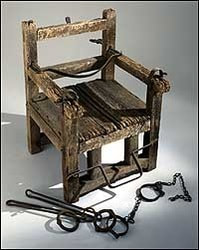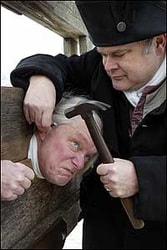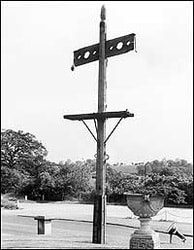 My favorite colonial author is Nathaniel Hawthorne, author of the “Scarlet Letter”. I always thought that the punishment for sins/crimes in the 1600-1700’s was being made to wear the letter of your sin on your clothing so all could see your guilt. Hawthorne’s scarlet letters were placed on their garments when in real life the marks were branded directly on the face or hands. Public shaming was the deterrent and the more common punishments were public whippings at the whipping post, being made to sit in the stocks or put in the pillory where your ears were nailed to the boards, or being strapped to a ducking stool. A ducking stool was one of the cruelest punishments, a form of water boarding, where the miscreant was strapped onto a stool and continually dunked into the creek, many died. My 9th g-grandmother, Martha Mead experienced being accused of a crime, being convicted and sentenced in 1654. Martha lived in Stamford, Connecticut in 1653, the daughter of one of the first landowners in Connecticut. Several months before her marriage to John Richardson, she discovered she was pregnant. She told her family and John that she did not know how it happened except that there was a day when she was working as a domestic servant she had an epileptic seizure and lost consciousness. When she regained consciousness, she found she had been taken to a bedroom and may have been raped. Even though she knew both men, she did not know which one had committed the crime. John admitted he wasn’t the father but did not want Martha “castigated” in the eyes of the Puritan town. So they moved to Roxbury, Massachusetts until after the baby was born. Unfortunately, the baby died within its first month of life so John and Martha moved back to Stamford. Of course the rumor mill started in the Puritan community that she had been pregnant before marriage and that the baby had died under mysterious circumstances. It was brought before the magistrates in New Haven and on October 18, 1654 the Court of Magistrates was called to hear the case and “take whatever action it deemed appropriate.” The charge was that “Martha Mead, now the wife of John Richardson of Stamford, was guilty of fornication, proued by her being with child some months before marriage, and that to avoyde or stopp reproach, her husband had carried her to Roxbury in the Massachusets, where she was deliuered of a child in January last, at the house of Mr. Joshua Hughes, wch child luied aboute or aboue a moneth and then dyed, but how and in what manner, the court though worth inquirie.” (Spelling are original to the era). Even though the court heard all testimonies to the case, including learning the names of the two men who were in the house at the time, the “court ruled it could do nothing else but find Martha Mead Richardson “guilty as charged, both of knowne fornication and continewed impudent lying, believing that no woman can be gotten with child without some knowledg, consent and delight in the acting thereof, and that she deserves to be publiquely and severely corrected by whipping, but considering she is now great with child, and according to testimony apt to fall into the forementioned fitts, with due respect to her condition it is ordered, that tenn pounds be paid as a fine to the jurisdiction within a years time for her heinous miscarriages.” The court acknowleged that “John Richardson, and her brother, Joseph Mead, did before the court as sureties ingage, and entered into a recognizance of fifty pounds for ye same, and vnder the same penalty promised and bound themselues that, betwixt this and the court of magisrats in May next, they would bring a satisfying certificate from Roxbury concerning ye death of ye child, both wch being duely pformed their ingagmnt and recognizance are voyd & discharged, but till ten stand in force, and in ye meane time if she duely acknowleg her sinn and truly declare who is ye father of the child, the court will consider of some further mitigation.” Final disposition of the case lingered on through three additional hearings. On May 28, 1656, Joseph Mead and John Richardson appeared in court at New Haven and acknowledged “payment of the fine of tenn pounds which was not required, but they desired forbearance till next Michaelmas when they then see it paide.” The court granted their request. On Sept. 27, 1657, William Mead, Martha’s father, and his youngest son, John, appeared in court petitioning for abatement of two fines. John had been fined ten pounds in a subsequent slander and harassment action, brought by a Stamford neighbor while the fine against Martha and levied against Joseph Mead and John Richardson remained unpaid. The court considered both and granted that “half of each should be abated, provided the other half be paid forthwith.” The issue was finally put to rest when Joseph brought in two “milch cowes” which he offered as payment of the fines. The court, following a recess to determine the value of the two cows, argued the “cowes” were worth “only eight pound tenn shillings,” but “in fauour to them (Joseph Mead and John Richardson),” the court would accept the cows as payment, and acquit and discharge the fines.” Sources:
Mead Family History by Jim German; http://www.mead-family.net/histories/Mead_Family_Ancestry.pdf “Martha Mead” by Lee Meade, 1996 Mead-e Family Newsletter “History and Genealogy of the Mead Family of Fairfield County, Connecticut, Eastern New York, Western Vermont and Western Pennsylvania from AD 1180 to to 1900” by Spencer P. Mead, LL.B.; Knickerbocker Press; New York, 1901. The New York Genealogical and Biographical Record Volume 47 January, 1916 pg. 86-88 The New York Genealogical and Biographical Record Volume 47 January, 1916 pg. 86-88
0 Comments
Leave a Reply. |
AuthorMy name is Vicky, and after researching my family history since 1999, I have found amazing stories that need to be told. I hope you enjoy them as much as I have! Archives
May 2023
Categories |



 RSS Feed
RSS Feed